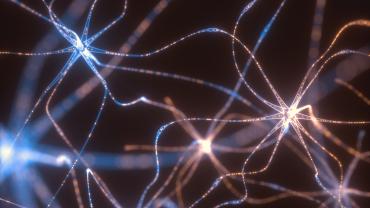
The body’s neurological network is dependent on neurotransmitters, which are molecules that help support the body’s communication system. In times of psychological stress, nutrient depletion, and other imbalances, the neurological network may benefit from supportive building blocks and other molecules. Research suggests that certain amino acids including gamma-aminobutyric acid (GABA), tyrosine, and taurine may help support certain aspects of brain health, mood, and cognitive function.
Evidence suggests that GABA may help support certain aspects of mental focus and mood health. GABA is a non-protein amino acid that acts as the primary inhibitory neurotransmitter in the brain and central nervous system. It is synthesized by pyridoxal-5-phosphate (P5P), the bioactive form of vitamin B6, and is also produced by certain bacteria in the gut microbiome. Impairments in GABA metabolism have been associated with certain mood disorders. A human randomized double-blind, placebo-controlled trial investigated high-dose vitamin B6 in young adults with self-reported anxiety and found that it increased inhibitory GABAergic neural activity and reduced self-reported anxiety symptoms. GABA may help modulate certain neural signals involving sleep, cognition, and mood. It has been shown in animal studies to help support a healthy stress response and help improve symptoms related to depression. The administration of GABA has also been shown to influence hippocampal monoamine neurotransmitter levels. In clinical studies, GABA administration has been shown to help improve sleep latency and support sleep quality.
The amino acid n-acetyl-l-tyrosine, the most bioavailable form of tyrosine, is a critical building block of catecholamines such as dopamine and norepinephrine. Conditions related to chronic stress can influence catecholamine levels in the body, which may have downstream effects including increased oxidative stress and changes to glucose metabolism. Research indicates that supplementation with tyrosine may help increase levels of dopamine and norepinephrine in the brain. It may also help prevent the depletion of certain neurotransmitters in actively firing neurons. Evidence suggests that tyrosine may help prevent cognitive changes associated with decreased catecholamine levels and may support brain health in individuals exposed to chronic stress.
Taurine is a sulfur-containing amino acid that is particularly abundant in the brain, cardiac, and skeletal muscle. It has many physiological actions in the body including supporting mitochondrial function, antioxidative status, cellular calcium levels, and membrane stability. Taurine may also play a role in neurological health through its ability to modulate the activity of certain neurotransmission pathways. It may help modulate certain neurological electrical activity through its influence on chloride ions. It may also support neurological development and nerve and muscle conduction networks.
While more research is needed before clinical conclusions can be made, certain neurotransmitter building blocks may help support aspects of mood and brain health. The amino acids GABA, taurine, and tyrosine may also help support cognitive function and neurological health.
By Dr. C. Ambrose, ND, MAT